Ecommerce Quizzes: The Secret to Higher Conversions?
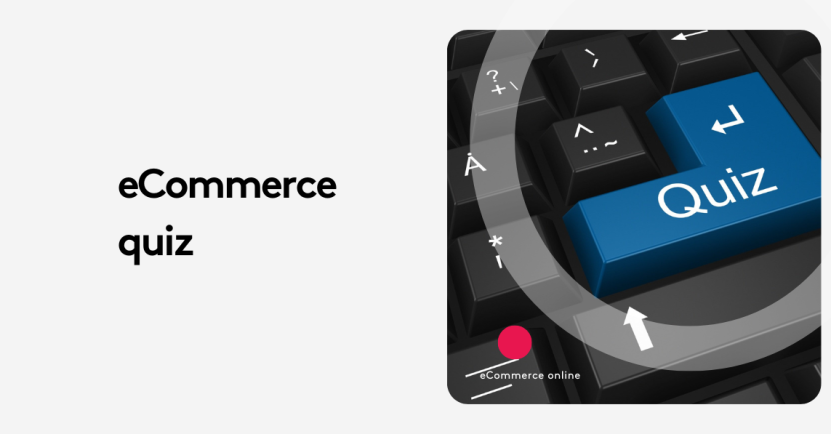
Summarize with
Ecommerce quizzes aren’t just trendy—they’re transforming how brands engage shoppers. From product discovery to personalization, these interactive tools are driving serious results.
If you’re selling your product online then chances are you’re constantly looking for innovative ways to drive sales and engagement. It can be tough to implement fresh ideas into your marketing plan, especially if you’ve been selling the same product for a while.
Connection through shared experience is set to be a massive trend in 2025. With brands already “clamoring” to take a piece of the gaming world, we can expect to see this trend following through into sales journeys, across markets.
This trend is emerging because of consumer demand to reconnect and to do so via authentic communities. With gaming communities being some of the strongest in the world, it’s no wonder brands are looking to gamify consumer experiences to try and find a new way of driving engagement through joyful marketing efforts.
Enter, online quizzes. We’ll be looking at great examples of eCommerce quizzes that are frontrunning content marketing strategies. BuzzSumo data shows that on average a quiz gets shared 1,900 times. That’s just an average quiz. Some of the top-performing quizzes that BuzzSumo tracked were shared nearly 4 million times.
In this article, we’ll be sharing some of the benefits a quiz can bring for your eCommerce sites and with some examples to inspire you.
Key takeaways
- Personalized sales: Quizzes can act like digital sales reps, offering tailored product recommendations to drive conversions.
- Content insights: Data from quizzes helps shape future content strategies by revealing customer interests and preferences.
- Audience growth: Well-designed quizzes are powerful tools for building email lists and growing brand communities.
- Content repurposing: Quiz results can be repackaged into videos, blog posts, or social media content to extend engagement.
On this page:
1. Replace a sales rep with a quiz
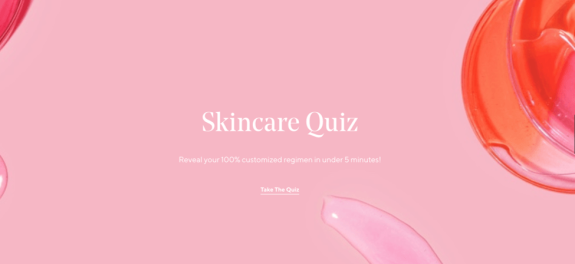
If you’re aiming to match your product type with a person and push them to make a buying decision, then this is the quiz type you’ll need to be implementing.
Product Match quizzes can take a salesperson’s script and rework it for a digital quiz format. For fast-moving consumer goods, quick quizzes like this can be a fun and engaging way to make a stickier experience, meaning they'll stay around longer and start really exploring your brand.
Essentially, you can take the consumer down a personalized sales funnel. You can even wrap up the quiz results with a CTA to buy the product, as Murad has done here.
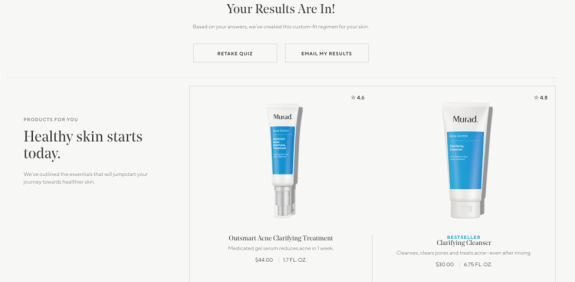
Key takeaway:
Use a quiz to offer the consumer a chance to buy your product and personalize recommendations, much like a sales rep, except more subtle.
2. Use data from your quiz to inform your content strategy
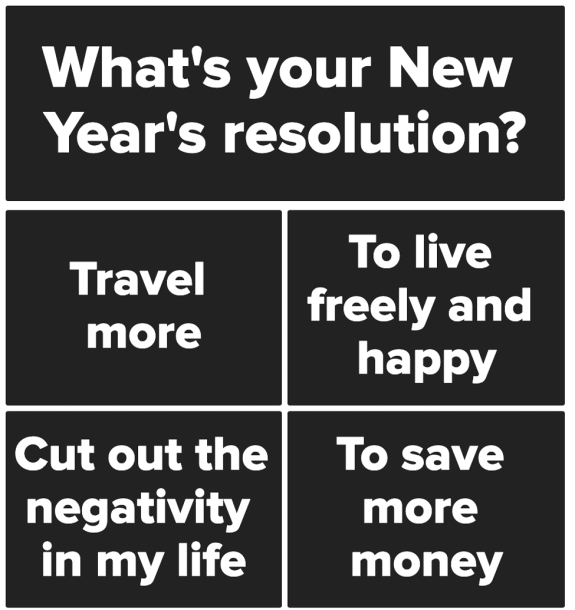
(Quiz from Buzzfeed: What will 2020 bring you?)
A quiz can benefit both parties. Yes, it's something for the consumer to enjoy, but it's also something the quiz maker can learn from.
Pulling data from your quizzes tells you the type of content that your consumers want to see, just like in the BuzzFeed example above.
When you make your own online quiz be sure to select questions that will inform your team of potential new content avenues to explore.
Key takeaway:
Collect data from quizzes to understand the demand for content and use it to influence your content strategy.
3. Grow your community & email list with a quiz
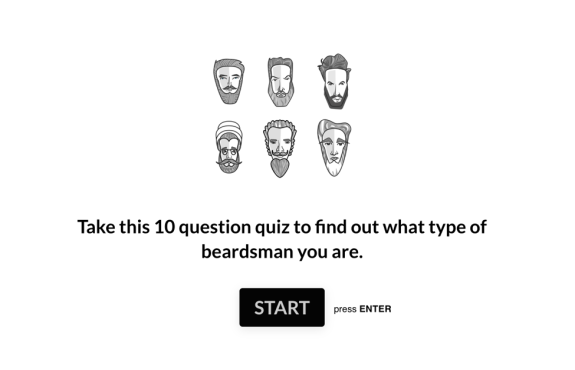
Beardbrand initially started as one man, Eric Bandholz. He noticed that bearded men needed a place to unite, digitally.
The Beardbrand website was a place to build community and later became an eCommerce platform, selling grooming products for men.
This quiz has been completed over 150k times and has helped Bandholz to build his second most successful mailing list. Sharing the quiz across different channels has been the main driver for brand awareness, especially when it comes to social media.
So, like Beardbrand, make sure any distribution of your quiz is threaded into your social media marketing plan for greater reach opportunities.
Key takeaway:
Create a well-designed quiz to effectively promote your brand and build an email list.
4. Repurpose content from a quiz
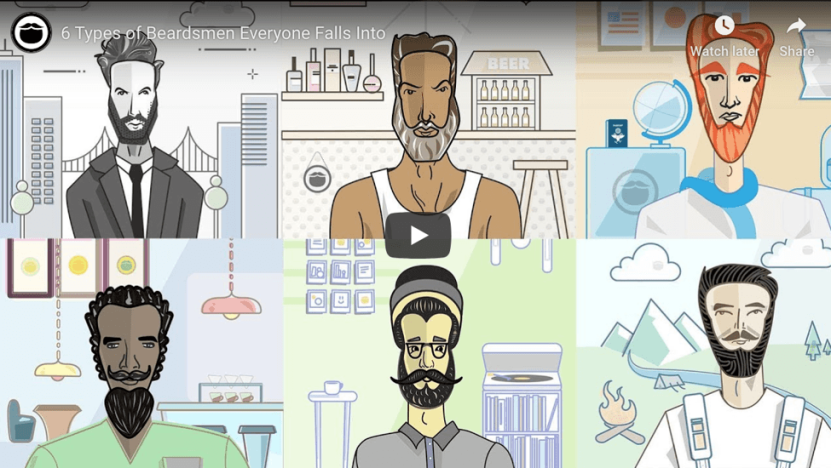
The Beardbrand quiz has also been converted into other forms of content. It now sits as a Youtube video titled: “6 Types of Beardsmen Everyone Falls Into” and the video has been viewed close to 100k times.
But don’t limit repurposing content to videos, infographics or images. Get creative! Any interesting findings or statistics gathered from the quiz can be mentioned in your next blog post or even in an upcoming podcast.
Key takeaway:
Use quiz results to create new content types relevant to your audience that drive engagement.
5. Make your quiz relatable to boost sales
So what made the Beardbrand quiz so successful? It’s shareability, sure, but also it’s relatability.
Bandholz used such a niche quiz that only someone within the brand’s target demographic would be interested in participating. The quiz is now reaching new audiences through organic shares and its supporting content.
However, it’s not just brand awareness that this quiz has helped Beardbrand with. The quiz has helped the business to identify new sales opportunities, too.
The brand noticed that a large portion of quiz participants mentioned travel as a hobby, Beardbrand responded by launching a travel range of products that could answer that need. The quiz has become such a vital part of Beardbrand’s growth strategy that they’ve implemented it as their “hero image” on the homepage.
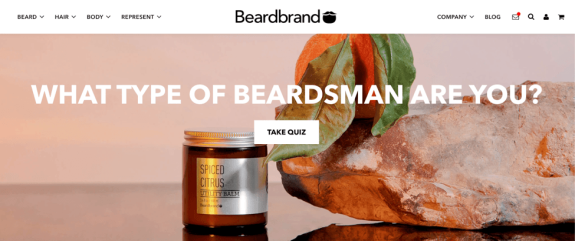
Beardbrand’s use case is the perfect example of combining customer acquisition with customer retention and business development. It’s the all in one eCommerce quiz.
Key takeaway:
Make your quiz relatable to your target demographic and identify new sales opportunities.
6. Re-engage idle shoppers with a quiz
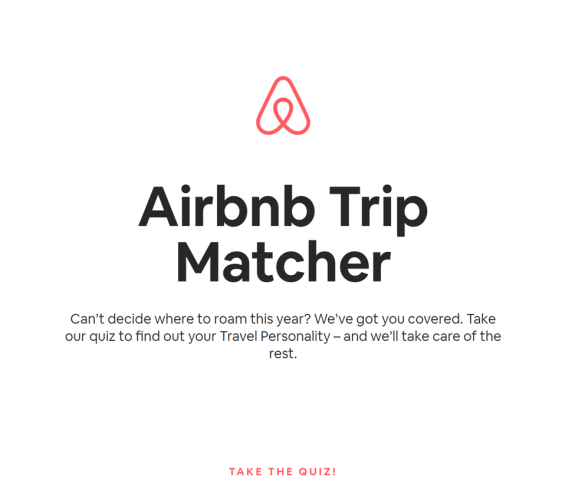
87% of marketers consider interactive content to be more attention-grabbing than static content. Airbnb has taken this into account with their Trip Matcher Quiz.
It’s all too easy to become an idle shopper today, with little brand engagement opportunities online we’re used to scrolling by so much content and not paying too much attention to what we’re seeing.
Quizzes change that and bring a level of interaction and engagement from a person that they don’t often get.
In Airbnb’s Trip Matcher they’re aiming to wake up that idle shopper and essentially push them into a decision-making phase of buying.
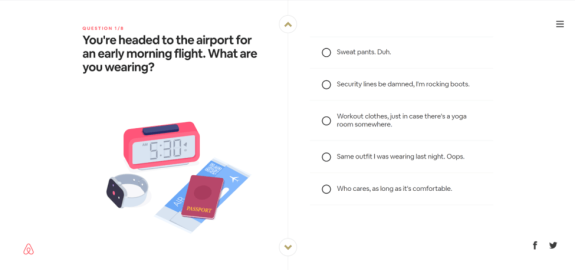
The quiz is genuine and written for humans. It lets you know what city would suit you best and why. Quizzes like this often work best for brands that sell at a higher price point. It inspires a person to make what can be a very difficult decision in a light-hearted way without any buyers remorse.
Airbnb has done a great job of upping their engagement opportunity with the idle shopper as well as upping their sales opportunity.
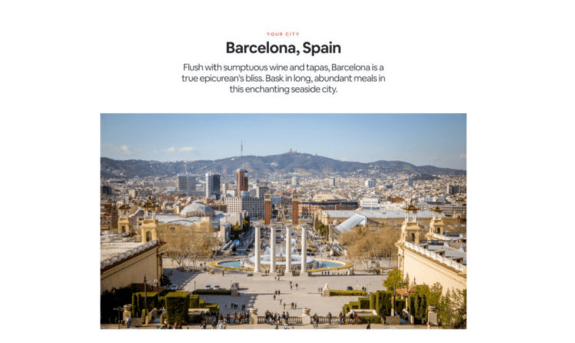
The results don’t only prompt the quiz taker to look into Barcelona. They go further by suggesting experiences they’d enjoy in the city as well as accommodation listings that would be a “perfect” match for the quiz taker.

Lastly, take note of the social share buttons. They’ve made it easy for the quiz taker to share the results of their quiz on personal social channels and only focus on platforms that they know are likely to get shares.
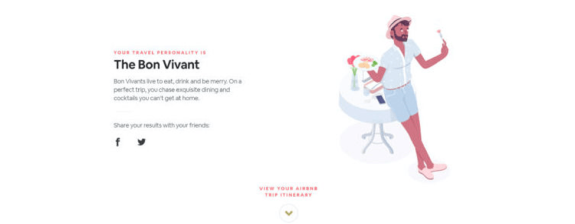
Key takeaway:
Lure idle online shoppers with a conversational-style quiz and gently push them into a buyers' frame of mind with products or services related to their interests.
7. Use quiz data to remarket at a later stage
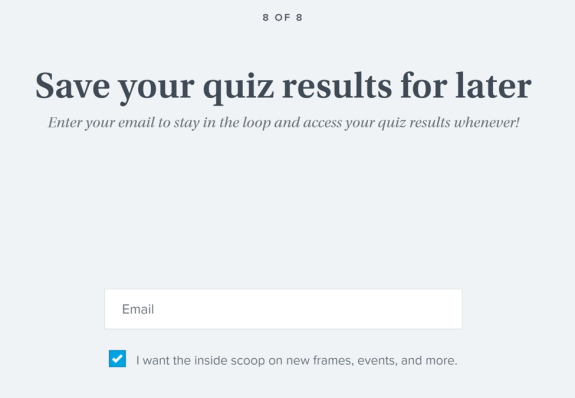
Warby Parker, the eyewear brand, has taken their quiz a step further. They’re using their quiz to capture leads and push them further down the funnel. Quizzes notoriously have a high completion rate, lead forms on the other hand, do not.
By using a quiz as a lead capture tool, not only are they getting valuable information on what’s the perfect fit and style for the consumer, they’re also getting an email address to be able to remarket that product to the consumer at a later date.
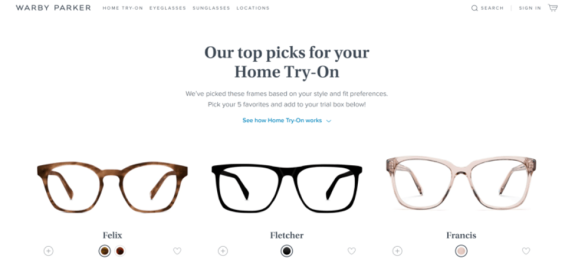
Key takeaway:
Use quiz data for effective remarketing and optimize quiz conversion rates by removing purchasing barriers.
That’s a wrap
Hopefully, some of these brand examples have helped to inspire your own quizzes for 2025 and you’ll be able to thread them into your content marketing strategy as well as optimize them to drive sales and engagement for your business.
Here are those key take away points again:
- Use a quiz to offer the consumer a chance to buy your product and personalize recommendations.
- Collect data from quizzes to understand the demand for content and use it to influence your content strategy.
- Create a well-designed quiz to effectively promote your brand and build an email list.
- Use quiz results to create new content types relevant to your audience that drive engagement.
- Make your quiz relatable to your target demographic and identify new sales opportunities.
- Lure idle online shoppers with a conversational-style quiz and gently push them into a buying frame of mind with products or services related to their interests.
- Use quiz data for effective remarketing and optimize quiz conversion rates by removing purchasing barriers.













